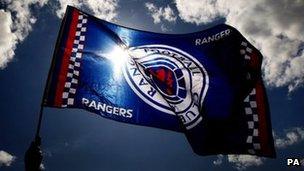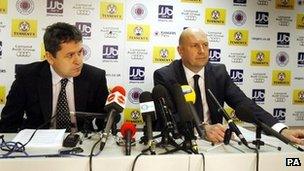Another Bill arrives at Ibrox
- Published

Bill Miller has been trying to get clarity on the penalties Rangers could face
So Rangers looks set for ownership by a tow-truck tycoon from Tennessee.
The announcement about Bill Miller being named as preferred bidder came only four hours after Sir Mervyn King, the governor of the Bank of England no less, was lured into commenting on radio about the financial problems at the Ibrox club.
He said: "I think any football fan has seen clubs get into financial difficulties so many times over the years, and they're rescued by some white knight who comes along, only for that white knight in turn to become the person who's disillusioned and walks away."
If you look at the proposal he published last month, Mr Miller sounds more of a cardiac surgeon than a white knight.
It talked of taking the healthy organs from Rangers and putting them in an incubator company, while the toxic parts of the company are radiated.
Once safe enough, the contents of the incubator are grafted back onto the original company.
It's colourful imagery to explain the creation of a new company, or new-co, into which the healthy bits of Rangers will be placed. It can then get on with the bits that football clubs are supposed to do when they're not paralysed by financial difficulties, such as playing football.
Meanwhile, Rangers Football Club plc continues to trade, but mainly to sort out its mountainous debt problems.
The administrators would continue to try to broker a deal with creditors, through a CVA or creditors voluntary agreement.
Once that's completed (if it's completed?), Rangers Football Club plc would be handed over to Bill Miller and the new-co "for a nominal sum".
Big tax bill
Bill Miller's statement last month said he was offering £11.2m.
It seems (though confirmed details are hard to find on this) that would be applied to paying off a share of debts. However, those debts are proving to be a moving target.

The administrators say liquidation has been much misunderstood
We still don't know if Rangers will be required to pay the "big tax bill" which remains stuck in tax tribunal limbo. That makes a big difference to the pay-out other creditors can get, and gives HM Revenue and Customs a pivotal role in any CVA.
Ticketus is the other big player, owed something north of £24m. It had advanced that sum to Rangers' majority shareholder Craig Whyte, much of it to fund his takeover of the Bank of Scotland's bank debt.
We can assume he found the £1 for Sir David Murray's 85% shareholding stake from his own resources.
If Rangers Football Club plc were to continue trading as it is, while seeking that CVA, Duff & Phelps administrators now say that "would take too long to effect".
And that suggests that the Blue Knights' bid - the last remaining rival to Bill Miller, led by former director Paul Murray and Sale Sharks owner Brian Kennedy - was running out of time for a conventional recovery.
It was also clear from the administrators' statement announcing their preferred bidder that the Blue Knights' bid remained a conditional one.
Liquid assets
A vital part of the Bill Miller plan is that it "avoids liquidation".
The administrators say that liquidation has been much misunderstood.
That route would involve selling the assets of a company - from its buildings to its brands to the contents of the stationery cupboard - and winding up everything to raise cash.
"There's no liquidation involved in this (Bill Miller's) strategy and we can't stress that strongly enough," say Duff & Phelps.
In any normal business, say in the manufacture of widgets, that liquidation route might have been a sensible route to getting out from under debt and getting the assets and workforce functioning again.
But this is not a normal business.
Rangers operates within the rules of football, and those rules punish clubs heavily for being liquidated and re-born.
Just as the rules of football are there to ensure fair play, there are financial rules intended to ensure fair play in funding the team that takes to the field, and those financial rules are getting tougher.
European regulations rule out a liquidated new-co club for three years, while the SPL, or Scottish Premier League, is yet to decide just how harsh to be - trying to strike a balance between making that financial option very unattractive to others, but not going so far as to harm the interests of the league as a whole.
'Compelling strategy'
Bill Miller's announcement of his bid last month sought to put pressure on the footballing authorities to waive any penalties, which struck an arrogant tone that sits uncomfortably with Rangers' position.
We're now told he has been trying to get clarity on the penalties Rangers could face, and that "significant progress has been made".
In any case, his bid has become unconditional, so that potential impasse seems to have been quietly resolved.
But the punishment potentially awaiting Rangers from football authorities is only one of the questions that still hangs over Bill Miller's bid for Rangers.
Some others worth keeping in mind:
How is Craig Whyte's 85% shareholding stake in Rangers Football Club plc to be prised out of his hands? There could be legal methods for the administrators to force his hand, or he could be made an offer he can't refuse - in connection with at least some of the £27.5m in personal and corporate guarantees he gave Ticketus for its money, for instance. As we learned yesterday from the administrators for Pritchard's stockbrokers in Bournemouth - another of the companies in which Mr Whyte was closely involved and where his role is getting very close attention from the authorities - he doesn't have his problems to seek, and may not be well-placed to hang tough on Rangers.
Next, will HM Revenue and Customs see a share of £11m as a better outcome than liquidation and sale of assets to a new company? You could argue that the club brand and the loyalty of its fans, plus Ibrox stadium, at least some remaining players and the training ground, could raise more than £11m in an unencumbered auction.
Then, how much does Bill Miller have available to invest in the club, beyond his initial bid? The club isn't allowed to sign new players for the next season, so he doesn't have to get his American Express card out just yet. But the club will need some capital to get back on its feet, and to look to build up the squad a year from now.
And that brings to mind one of the other puzzling aspects of Bill Miller's bid.
Why? What's in this for him?
I haven't heard any suggestion that he's committed to Scotland or to Rangers or to football.
And, to be frank, it's only because of such a commitment that anyone would wish to park their money in the hugely complex problems at Ibrox.
There's evidence that the businessman has shown an interest in other sports or clubs, but without any significant track record.
So Rangers fans are right to question Miller's motivation for this, and that doesn't seem to have been one of the administrators' concerns.
The announcement of a preferred bidder is a big step forward in a process that's nearing the three-month mark.
The administrators sound confident it brings "an entirely workable strategy" and that it's "a compelling strategy".
But Rangers is a long way from being out of the woods yet.